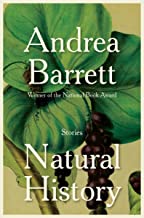Natural History by Andrea Barrett 2022
This is the fourth short story collection by Barrett that I’ve read, and as with the prior three, I thoroughly enjoyed the experience. Barrett is a 68 year old woman who lives in the Adirondacks, has taught for 15 years at Williams, was named a MacArthur fellow, and has won the National Book Award and been nominated for a Pulitzer. Her genre is probably best described as historical fiction, though her stories usually weave from the present as well as the past.
She focuses on women and science often referring to the same characters in multiple stories in the book, and as in ‘Natural History’, she will also carry some characters over from book to book. I re-read my reviews of the prior three collections in order to see if I had commented on Henrietta and Daphne, the main characters in ‘Natural History’, in those books, but I hadn’t nor could I remember them. Nonetheless, I found it thrilling that Barrett pointed out the continuities in her work in a final section of the book entitled Author’s Note and Acknowledgement. It’s a good illustraton that while we inevitably forget huge swaths of what we have read, there remains an impact, a residue, an influence from all prior reading.
The title of this collection is a double entendre referring to the scientific disciplines that weave through the stories from Henrietta’s focus on butterflies and moths and Daphne’s focus on the seashore in the first story in the late 1800’s to Henrietta’s great-great niece Rose and her friend Daphne’s focus on structural biochemistry and ubiquitin in the present time. I loved her choice of ubiquitin, a real protein named for its ‘everywhereness’ in cells. Very little real action takes place in these stories as they examine family, relationships, and life through the last 150 years. In a wonderful touch, Barrett provides the reader with a diagram of the family trees of all those in these stories and places it at the very end of the book. In complex fictional narratives, I will often draw such a family tree on the endpaper of the book (if it is mine, of course, and not the public library’s!) and in doing so herself and reserving it for the completion of the book, Barrett acknowledges the importance of family while not distracting the reader too soon.
In thinking about why I enjoy Barrett’s work so much, I think it comes down to the fact that her characters are not only interesting and competent, but they’re very likable. Henrietta and later Rose devote themselves to teaching science to children and are content to live in small towns without a husband, and yet seem happy and complete. Good to find happy characters these days!
I think Barrett is among our most creative, resourceful, and interesting practitioners of the short story form. If you haven’t read her, you should do so.



